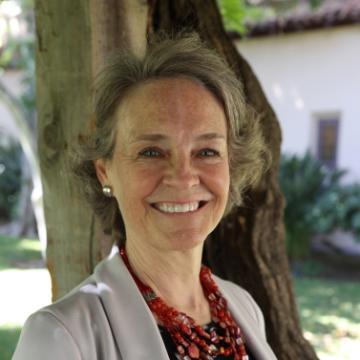A Pilgrimage of Accompaniment
Commencement is a time for completing our studies and going into the world. It calls us to reflect on our path. The image of pilgrimage comes to my mind: the students' studies at Santa Clara University have been just one stage of their pilgrimage, as they learn to be people for and with others. Faculty, staff, benefactors and partners have been blessed to accompany students on their journeys, linking arms on their paths, and highlighting the core meaning of accompaniment: to be a companion, to be with others in breaking bread and daily life.
This past Spring break, I was fortunate enough to join faculty, staff and Ignatian Center advisory board members on an Immersion of accompaniment to the Kino Border Initiative on the US/Mexico Border. Since I don't speak Spanish, I tried to accompany families in the shelter with simple smiles and supportive nods, hugs, and good wishes - 'bueno, bueno.' Other members of our group played basketball and Loteria with the kids, or offered a listening ear for people who shared their stories of both loss and hope. In the same way, ICJE students accompany communities during their immersions and fellowships, and in the placements for Arrupe Engagement classes. They often share bread with the host communities and, more symbolically, they share the pilgrimage of life with one another.

This past Spring Break the Ignatian Center hosted an Immersion to the US/Mexico Border. The 11 participants were hosted by Kino Border Initiatives and took part in a variety of opportunities to learn about all aspects of the border immigration system, including desert walks, meeting with border patrol and ranchers in the area, and spending time in accompaniment with migrants at the Kino facility.
Read about their experiences here

SCU students who went on the Flint Michigan Immersion last Spring made it on the local news! As Gabby Ruiz '06 says in the interview, "Our school focuses a lot on educating the whole person, so it's really important for us to go outside of our comfort zones and be able to identify issues in other communities and to learn from them."
Watch the news story here



